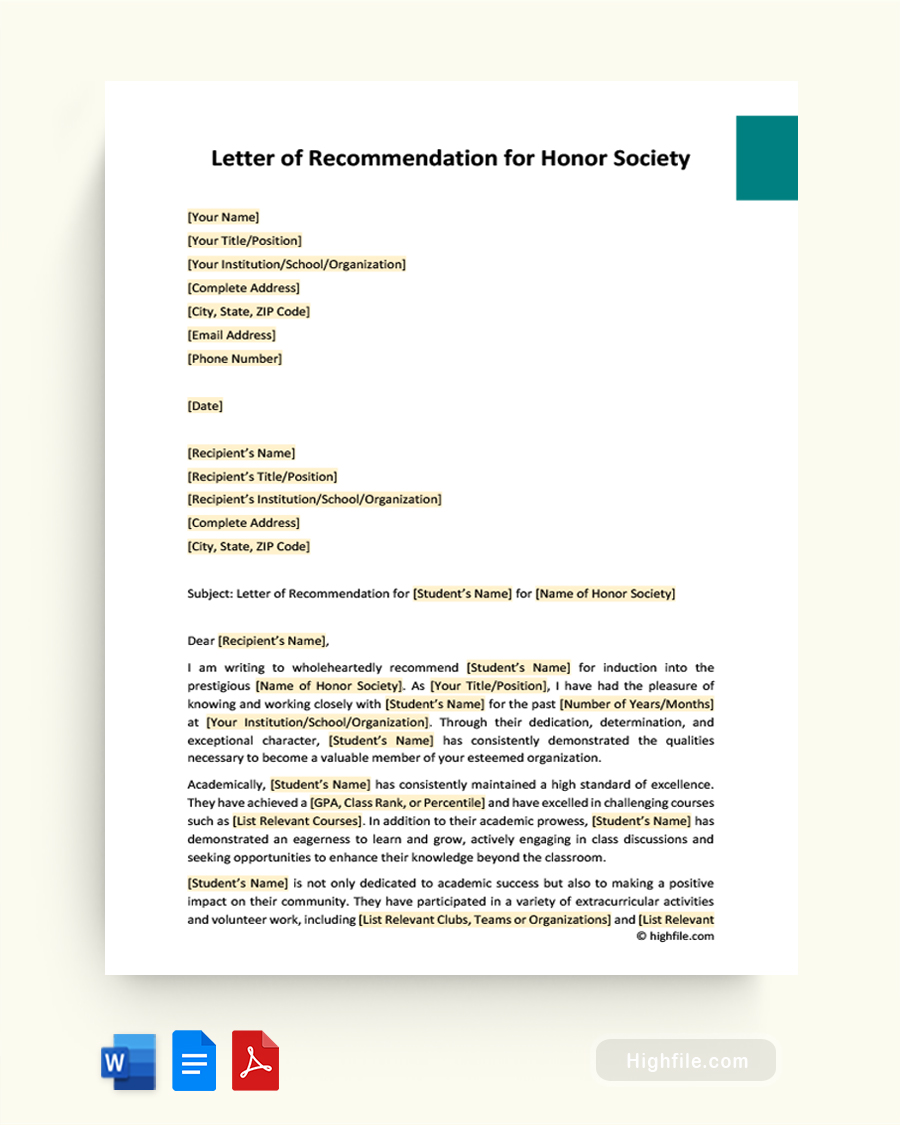Joining an Honor Society is a prestigious achievement for students, and a Letter of Recommendation is a critical component of the application process. This letter is a formal endorsement from a teacher, professor, or academic advisor who can attest to the student’s academic achievements, leadership skills, and character. A well-written letter can significantly increase the student’s chances of being accepted into the Honor Society and potentially open up scholarship opportunities and other academic pursuits. Using a template to create the letter can save time and ensure all necessary information is included. Templates can also help students to present themselves in the best possible light, making a strong impression on the reviewer and improving their chances of acceptance.
What Is a Letter of Recommendation for Honor Society
A letter of recommendation for Honor Society is a written statement provided by a teacher, mentor, or supervisor to attest to the academic achievements, personal qualities, and potential of a student or individual seeking membership in an Honor Society. The letter usually outlines the student’s academic record, involvement in extracurricular activities, leadership skills, community service, and other relevant accomplishments. It aims to objectively evaluate the candidate’s character, abilities, and potential contributions to the Honor Society. A well-crafted letter of recommendation can significantly increase the student’s chances of acceptance into the Honor Society.
Fun Fact: Some honor societies have specific requirements for the format and content of the letter, such as a specific number of paragraphs or a certain number of examples of the student’s leadership skills.
Why Is a Letter of Recommendation for Honor Society Important?
A Letter of Recommendation for Honor Society is an essential document that students need to support their application to join an Honor Society. The following are reasons why it is important:
- Provides a formal endorsement from a teacher, professor, or other academic advisor who can attest to the student’s academic achievements, leadership skills, and character.
- Strengthens the student’s application and increases their chances of being accepted into the Honor Society.
- Opens up opportunities for scholarships, internships, and other academic pursuits.
- Helps students to organize their thoughts and present themselves in the best possible light, making a strong impression on the reviewer.
- A letter of recommendation can provide insight into a student’s personal qualities and character, which may not be evident from their academic transcripts.
- Honor societies often have a competitive application process, and a strong letter of recommendation can help a student stand out from other applicants.
- In addition to being important for the Honor Society application, a well-written letter of recommendation can also be a valuable asset for future academic and professional pursuits.
Important Tip: A well-written, thoughtful endorsement can help a student achieve their academic dreams. Remember to maintain a formal, polite tone throughout your letter.
Essential Elements of a Letter of Recommendation for Honor Society
The essential element of a letter of recommendation for Honor Society support a student’s application to join an Honor Society. It is an essential part of the application process as it helps the reviewing committee to assess the student’s academic achievements, leadership skills, and character. By providing this letter, you are testing to your personal experiences with the applicant.
- Writer Information: The name, position, and contact information of the letter’s writer.
- Date: The date the letter was written.
- Recipient Information: The name and contact information of the person or organization the letter is addressed to.
- Subject Line: A concise statement that summarizes the purpose of the letter.
- Formal Salutation: A formal greeting that addresses the recipient respectfully, such as “Dear Members of the National Honor Society.”
- Introduction: A brief introduction that provides context for the letter and establishes the writer’s relationship with the student.
- Body: A detailed explanation of the student’s academic achievements, leadership skills, and character, including specific examples to support the writer’s claims.
- Summary and Endorsement: A summary of the student’s qualifications and an endorsement of their suitability for Honor Society membership.
- Formal Closing (Sincerely): A formal closing that expresses gratitude and respect, such as “Sincerely” or “Respectfully.”
- Invitation to Contact: An invitation for the recipient to contact the writer for further information or clarification.
- Re-State Contact Information: The writer’s contact information, including phone number and email address, in case the recipient needs to contact them.
Pro Tip: Instead of providing dry, dull facts and statistics, try to illustrate your points and endorsement with honest, engaging personal stories and anecdotes about the applicant. The readers of these documents see dozens or hundreds a year, if not more. Your applicant will be more memorable if they aren’t mere numbers on a page.
FAQs
A letter of recommendation for National Honor Society should include an introduction of the writer and their relationship with the student, a brief summary of the student’s academic achievements, leadership qualities, character traits, and involvement in extracurricular activities. The writer should provide specific examples and anecdotes to support their claims and showcase the student’s strengths. The letter should also explain why the writer believes the student is an ideal candidate for the National Honor Society and how their inclusion would benefit the organization. The letter should be written in a professional tone and formatted appropriately, with the writer’s contact information and signature included at the end.
To get accepted into an Honor Society, you need to meet the eligibility criteria, which typically include a minimum GPA and demonstration of leadership, community service, and character. Students may also need to demonstrate excellence in specific subject areas or have completed a certain number of community service hours. Once you have confirmed that you meet the eligibility criteria, you can apply to the Honor Society by submitting an application, which usually includes a personal statement, letters of recommendation, and transcripts. After reviewing the applications, the Honor Society will select the most qualified candidates for membership. To increase your chances of being accepted, it is essential to put effort into your application, highlight your strengths and achievements, and provide compelling letters of recommendation from academic advisors and community leaders.
Getting accepted into the National Honor Society can be competitive and challenging, as the organization typically requires students to meet rigorous academic and leadership standards. While the specific requirements may vary by school or chapter, students are typically expected to maintain a high GPA, demonstrate leadership skills through extracurricular activities, and exhibit strong character and community involvement. Additionally, the selection process often includes a review of the student’s transcript, an application, and a letter of recommendation from a teacher or academic advisor. While it may be challenging to meet these standards, being accepted into the National Honor Society can be a valuable achievement, providing students with opportunities for scholarships, internships, and other academic pursuits.
Key Points
A Letter of Recommendation for Honor Society is an essential document that students need to support their application to join an Honor Society. The letter serves as a formal endorsement from a teacher, professor, or other academic advisor who has worked with the student and can attest to their academic achievements, leadership skills, and character. A well-written letter can strengthen the student’s application, increasing their chances of being accepted into the Honor Society and potentially opening up opportunities for scholarships, internships, and other academic pursuits. Using a template to create the letter can save time and ensure all necessary information is included. Templates can also help students to organize their thoughts and present themselves in the best possible light, making a strong impression on the reviewer.







